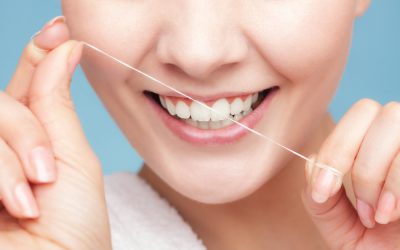Gum health is just as important as tooth health. In fact, healthy gums are good for your overall health – scientists have connected severe gum disease with chronic conditions like diabetes, stroke and heart disease.
Gum disease is highly preventable by practicing good oral hygiene and eating a healthy diet. Keep reading to learn how to tell the difference between healthy and unhealthy gums, along with tips you can follow to maintain the health and well-being of your gums.
Healthy Vs. Unhealthy Gums
Healthy gums are pink, firm and don’t bleed easily. Gum disease develops when dental plaque and bacteria build up under and around the gum line and cause infection. With early identification, mild gum disease (gingivitis) is extremely treatable by practicing good oral hygiene. But if gingivitis festers, severe gum disease (periodontitis) develops. Periodontitis can cause permanent gum, jaw, tissue, bone and tooth damage, and it is a leading cause of tooth loss among adults.
Some factors place you at greater risk for developing gum disease, including diabetes, heart disease, rheumatoid arthritis, medications that cause dry mouth, malnutrition, obesity, age, stress and genetics. If you have any of the above risk factors, then see your dentist for regular check ups and observe any changes you notice in your oral health.
The following are signs and symptoms of unhealthy gums. If you experience any of these gum symptoms, seek an appointment with your dentist as soon as possible.
- Swelling
- Redness and inflammation
- Tenderness or pain
- Pain with chewing
- Persistent bleeding during flossing and brushing
- Bad breath (halitosis)
- Loose teeth
- Gum recession
Untreated periodontitis can worsen into a life-threatening oral infection. If you experience fever and severe mouth pain, seek emergency dental care.
Tips for Gum Care
Keep your gums healthy with good oral hygiene and diet habits. Practicing the following care tips at home will substantially lower your risk of developing gum disease.
- Brush your teeth daily. Brush your teeth twice a day for 2 minutes each time. Use a toothpaste that contains fluoride, a mineral that helps strengthen enamel and protect your teeth from cavities. Look for a toothpaste that has the American Dental Association (ADA) Seal of Acceptance. For the most effective brushing, follow the technique outlined by the ADA. And don’t forget to change your toothbrush regularly.
- Floss daily. Floss once a day to remove plaque and food particles that your toothbrush can’t reach. The act of flossing is more important than the time of day you floss – pick a few spare minutes to get it done whenever you can.
- Use fluoridated mouthwash. Rinse with a fluoridated mouthwash after brushing your teeth. Mouthwash will help remove bacteria and food particles and fluoride will help protect your tooth enamel. Be sure to choose a rinse with the ADA Seal of Acceptance.
- Eat a balanced, whole-food diet. Reduce your intake of sugary, starchy and chewy foods, which can all contribute to tooth decay and gum disease. Instead, eat a whole-foods diet with plenty of fresh fruits and veggies. Eat fibrous foods like apples, celery and leafy greens because fiber requires a lot of chewing, which helps clean out the mouth. Enjoy dairy products like yogurt and cheese, which increase saliva production and contain tooth-strengthening calcium.
- Rinse your mouth out after eating. It’s not necessary for you to brush your teeth after every meal or snack. But make an effort to rinse your mouth out with clean water after eating. Rinsing removes sugars and food particles lingering in the mouth.
- Quit smoking. Smoking and tobacco use is a leading cause of gum disease. Because smoking weakens the immune system, your body will have a harder time fighting off infection and healing quickly.
- Visit your dentist regularly. See your dentist regularly for professional cleanings. A deep clean removes plaque and tartar you may have missed while brushing and flossing. Additionally, your dentist can identify and treat early symptoms of gum disease before they cause further damage. Early gingivitis may be painless and present no symptoms – your dentist knows what to look for and when to start treatment.
Boyett Family Dentistry is a trusted local dental practice in Winter Haven, FL. We offer a full range of family dental services, including professional cleanings, restorative solutions and gum disease treatment. If you have any questions or concerns about the health of your gums, give us a call at 863-294-9200.






